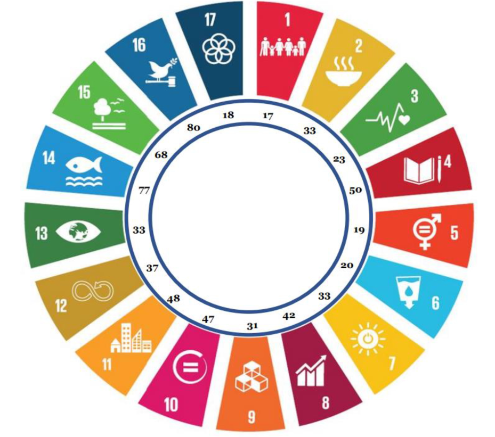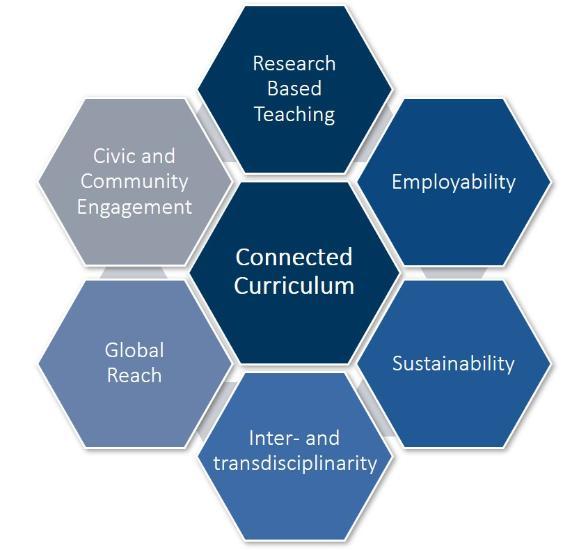Purpose
This project aims to foster the development of globally-minded and action-oriented citizens who are empowered to help create solutions for a sustainable future. With this in mind, the SDG Toolkit project has developed and curated resources to support staff in integrating sustainability into learning and teaching using the lens of the U.N. Sustainable Development Goals (SDGs). Resources in the SDG Toolkit were informed by student and staff consultations.
The resulting SDG Toolkit emphasizes active learning pedagogies, including project-based learning, problem-based learning, and case studies. A Community of Interest emerged during the development and piloting of the toolkit which makes it more dynamic and can be built on to encourage further knowledge exchange and transdisciplinary collaboration. We invite you to engage with the SDG Toolkit and partner with us to ensure our graduates:
- Are informed and responsive citizens
- Are enabled by the key competencies embodied in Education for Sustainable Development
- Attain the skills, knowledge and abilities reflected in the core UCC Graduate Attributes and Values.
Background
Over the past decade, UCC has developed a comprehensive approach to sustainability with the institutional ecosystem serving as a living laboratory to provide context for the core curriculum, the hidden curriculum and the co-curriculum. This encourages students to express their academic understandings through practice, engagement and creativity (Fig. 1).

Fig 1. Examples of sustainability within dimensions of the UCC curricula and the institutional culture enabling activism in the forms of practice, engagement and creativity. The core curriculum consists of academic programmes of study such as engineering or environmental sciences. The hidden curriculum consists of, pedagogy-based event such as the Bio-Blitz or Hackathons, and co-curricular would be exemplified by UW modules
The 2018 The Sustainability Tracking, Assessment & Rating System (STARS Report), however, determined that less than 6% of modules taught at UCC were characterized as ‘focused-on’ or ‘related-to’ the SDGs while 60% of academic departments had sustainability course offerings (Fig. 2). This gap analysis revealed an opportunity for UCC to expand sustainability offerings within the core curriculum. Furthermore, when sustainability is integrated into the core curriculum, it becomes accessible to all students since some might lack the wherewithal to participate in hidden curriculum or co-curriculum.

Fig 2. Current coverage of SDGs in UCC Curriculum (numbers refer to number of modules related to each SDG).
The UCC Academic Strategy was also launched in 2018 which includes the Connected Curriculum (Priority 1). Sustainability is a core element of the Connected Curriculum which is characterized as:
"Balancing environmental objectives with economic and social sustainability objectives, including elements such as infrastructure, health, and equality. The UN sustainable development goals provide a helpful map as to what issues are of highest priority and these help shape the world agenda in this area."

Fig 3. The 6 core strands of the UCC Connected Curriculum framework
In an effort to strengthen the sustainability element of the Connected Curriculum, the Green Campus programme and Centre for the Integration of Research, Teaching and Learning (CIRTL), launched a collaborative project to develop a suite of web-based resources to assist teaching staff with the integration of SDGs into UCC curricula. This was funded by The National Forum for the Enhancement of Teaching and Learning in Higher Education and The Higher Education Authority. UCC 2022: Delivering a Connected University continues to place sustainability at the forefront of an institutional strategic pivot in response to emerging challenges such as the global pandemic and the climate crisis.
Objectives & Process
-900x635.png)
Fig. 4. Depiction of 6 primary steps in the SDG Toolkit development which is conceptualized as a cyclical process.
| SDG Toolkit Development Process (2020-2021) |
|---|
| 1. Literature review of existing global best practices, case studies and research within the context of Education for Sustainable Development and the SDGs. |
| 2. Toolkit development is framed within UCC and National strategic objectives which places an emphasis on authentic experiential and group learning opportunities. |
| 3. Development of a transdisciplinary Community of Interest with the intent to facilitate knowledge sharing related to SDG integration into curricula. The CoI organically emerged during staff and student focus sessions |
| 4. Creation of user-friendly web-based resources to assist teaching staff to frame existing module content through the lens of the SDGs. The toolkit was informed by focus sessions with staff and students from a diverse cross-section of disciplines and levels of previous engagement at UCC as well as national and international stakeholders. Pilot lectures with SDG resources were presented in all four colleges at UCC. |
| 5. Mapping by staff of SDG content in teaching and related activities during professional development workshops and reflection upon approaches to further integrate the SDGs into assessments and learning outcomes. Staff feedback on the toolkit was gathered in the workshops for refinement of the toolkit. |
| 6. The SDG toolkit website was launched in the summer of 2021. |
Project Review Video for the National Forum
SDG Toolkit for Teaching and Learning
Contact us
UCC Green Campus Programme & the Centre for the Integration of Research, Teaching and Learning ,

SDG Curriculum Toolkit by John Barimo, Catherine O’Mahony, Gerard Mullally, John O’Halloran, Edmond Byrne, Darren Reidy, Maria Kirrane is licensed under a Creative Commons Attribution-NonCommercial 4.0 International License.
Based on a work at https://www.ucc.ie/en/sdg-toolkit/.
